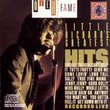| All Artists: Beethoven, Brahms, Bach, Bartholdy, Serkin Title: Rudolf Serkin, Piano: Schubert, Bach, Beethoven, Brahms, Mendelssohn-Bartholdy Members Wishing: 0 Total Copies: 0 Label: Aura Classics Release Date: 12/28/1999 Genre: Classical Styles: Opera & Classical Vocal, Chamber Music, Forms & Genres, Sonatas, Historical Periods, Baroque (c.1600-1750), Classical (c.1770-1830), Romantic (c.1820-1910) Number of Discs: 1 SwapaCD Credits: 1 UPCs: 801439012424, 8014394521241 |
Search - Beethoven, Brahms, Bach :: Rudolf Serkin, Piano: Schubert, Bach, Beethoven, Brahms, Mendelssohn-Bartholdy
 | Beethoven, Brahms, Bach Rudolf Serkin, Piano: Schubert, Bach, Beethoven, Brahms, Mendelssohn-Bartholdy Genre: Classical
|
CD DetailsSimilarly Requested CDs
|
CD ReviewsSerkin as you've never heard him! Richard Steiger | Murray, KY USA | 04/12/2001 (5 out of 5 stars) "Those familiar with Rudolf Serkin primarily from the drab DGG recordings made when he was well past his prime, or as Columbia's "house pianist" in the 50s and 60s, are in for a surprise when they listen to this stunning live recital disc, recorded in 1957. Serkins begins (the actual recital began with the G flat impromptu, but there was no time for it on the cd) with the last of Schubert's impromptus, played at an almost impossibly furious pace, a performance that makes all others sound tame by comparison. Bach's Capriccio on the Departure of his Beloved Brother is an extraordinary example of a great musician can make Bach completely idiomatic on the piano. The opening section of the work is particularly moving. The Appassionata Sonata is rather conventional in the outer movements, but remarkably grave and dignified in the (quite) slow second movement. This movement is usually a letdown, but not here, where it takes its place with the great Beethoven slow movements. Brahms' wonderful Handel Variations receives a romantic performance with more tempo fluctuation than is usual. Though I prefer Arrau's steadier performance (another live recital on Aura not to be missed), this mercurial performance is hard to resist. Finally, some Mendelssohn tossed off with stunning velocity and accuracy. One doesn't usually think of Serkin a s a super-virtuoso, but this live recital leaves no doubt of it. The sound of the cd, though not as good on some other Aura recitals, is perfectly listenable. Serkin's pedaling is more than a little noisy at times, but on this disc it just seems to underscore the intensity of his playing. No one interested in great piano playing should be without this disc." ANY WAY I CAN GIVE THIS 7 STARS? DAVID BRYSON | Glossop Derbyshire England | 11/06/2001 (5 out of 5 stars) "(...) The recorded sound is not some wonder of technology, but I like it because it is more like Serkin as I remember him than many of his studio recordings. In the Appassionata particularly the more 'rounded' sound has me preferring this version. There is not a lot of difference between the readings, but this time the first movement avoids sounding hypertense, it's the sound-quality that makes the slow movement as notable as Mr Steiger rightly says, and the clincher is the sinister pianissimo muttering of the main theme of the finale as captured on this disc.For me this is THE Brahms Handel because of Serkin's incomparable rhythmic subtlety and sense of timing. I could go through every variation raving about this or that felicity, but instead I shall just draw attention to the marvellous playing of the theme itself and then skip to the last four, starting with the slow hypnotic playing of the drone-base number followed by the next two rushing at us out of the darkness and into the heavenly light of the last one.Serkin presents the human face, as opposed to the superhuman face, of Bach just beautifully. Obviously Bach belongs on the harpsichord, but instruments were made for music and not the other way about, and if I lose any sleep over this performance of the Capriccio it will be because I can't get that horn-call out of my head not because of any worries about purism. One fastidious and inspired classical aristocrat interpreting another is good enough for me.Apparently we have had to sacrifice one of the Schubert Impromtus from this recital because it wouldn't fit on the disc. Oh well, the thing that strikes me about this reading of op 142#4 is just how Schubertian it sounds. With no tunes and a rapping morse-code rhythm it is not exactly his most characteristic effort, and I would not have expected to have been made more conscious of who it is by when the interpreter goes at it full-throttle. But then this is no ordinary interpreter.Try the Mendelssohn rondo on your musical friends and ask them to guess who is playing. Top prize goes to whoever guesses 'Mendelssohn'. You may expect 'Horowitz' and 'Cziffra' from the runners-up, but they will realise that there is something familiar about that cantabile and especially about that rhythmic poise and urgency -- he is literally still pressing the tempo forward in that characteristic way he had even when the tempo is as unbelievable as this. Also read the booklet which is quite brilliant in its comments here. This will blow you away." A historical recital! Hiram Gomez Pardo | Valencia, Venezuela | 08/24/2005 (5 out of 5 stars) "Lugano May 1957: the legendary Austrian pianist Rudolf Serkin, Casals' lavish son will write possibly without knowing one of the most celebrated and commented recitals of that decade.
Unusual repertoire by the way; Schubert's Impromptus, Beethoven, Bach, Brahms and Mendelssohn as encore. Schubert sounded very expressive and cantabile. His Bach resulted a nice surprise, loaded with freshness, without stylistic poses, very touching and musical. His phrasing was accurate and precise. Appassionata has been always a hard contender for ay pianist. Even his fierceness and splendid attacks, the climax seemed to lack this unstoppable dynamics and wildness. I have always thought the last movement must be played with increasing urgency sense and undeniable ferocity to get finally the cathartic explosion in the final coda. Serkin looked something restrained and controlled. And that was a surprise due I have listened his impressive studio recordings in the early fifties and his vision was plenty of febrile tension. The treasured finding were the Handel Variations. An overwhelming performance filled with expressiveness, asserted articulation, and wholeness. His accents, inflexions and slender phrasing doesn't permeate the required forte and fortissimos impregnating the score of vivifying rapture, majuscule musicality and visible emotion. An unforgettable musical encounter, a superb historic document and a magnificent resemblance that shows once more why Serkin is so beloved, admired and reminded artist all over the world. A human being who enriched enriching himself due those happy interplays first with Busch ensemble in the thirties and late in Prades with Stern, Vegh, Szigetti and so many luminaries , enhancing prestige, musical stature and increasing maturity and wisdom that made of him one of the supreme exponents of the keyboard . " |

 Track Listings (9) - Disc #1
Track Listings (9) - Disc #1


